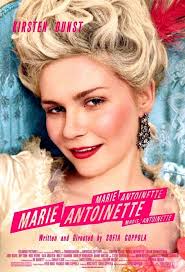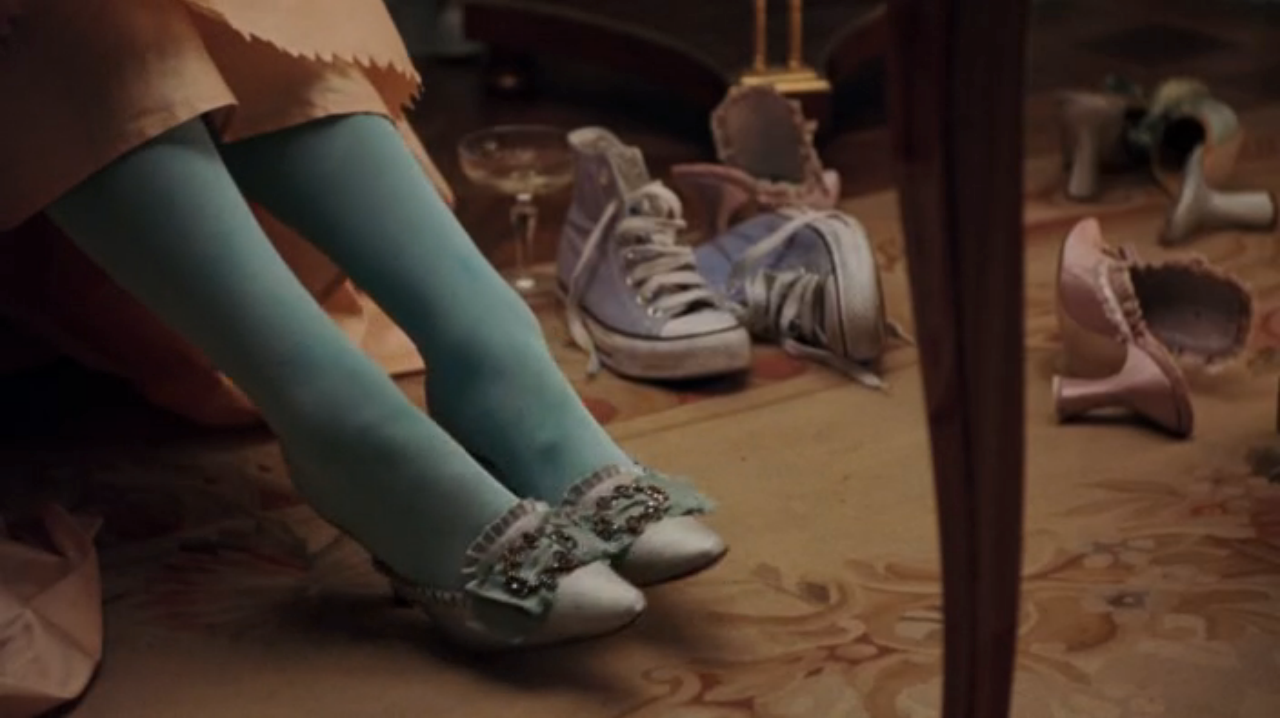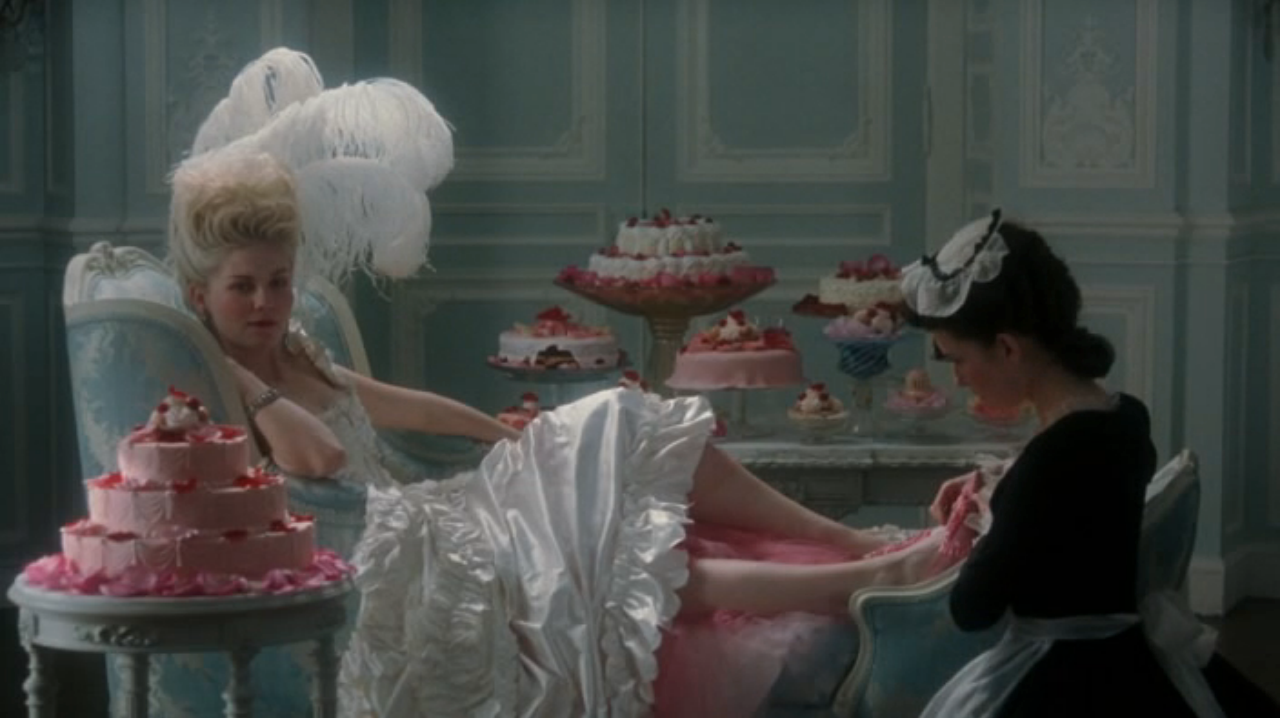Women's Pictures - Sofia Coppola's Marie Antoinette
 Thursday, May 21, 2015 at 5:34PM
Thursday, May 21, 2015 at 5:34PM
 Who knew a period piece about Marie Antoinette would be Sofia Coppola's most controversial movie? Basically, whether or not you like Coppola's 2006 Marie Antoinette boils down to how you feel about anachronisms. Anachronistic details - modern fashion in a period piece, pop music played at a ball, a much-maligned pair of lavender Converse sneakers - are by design attention-grabbing. Like equally flamboyant directors Baz Luhrman and Quentin Tarantino, Sofia Coppola’s purpose is to jar audiences in the present, setting up a stylized world where (hopefully) audiences can relate more closely to people who lived decades or centuries ago. Coppola uses anachronisms to help the audience appreciate the rebellious streak of Marie Antoinette’s hedonism.
Who knew a period piece about Marie Antoinette would be Sofia Coppola's most controversial movie? Basically, whether or not you like Coppola's 2006 Marie Antoinette boils down to how you feel about anachronisms. Anachronistic details - modern fashion in a period piece, pop music played at a ball, a much-maligned pair of lavender Converse sneakers - are by design attention-grabbing. Like equally flamboyant directors Baz Luhrman and Quentin Tarantino, Sofia Coppola’s purpose is to jar audiences in the present, setting up a stylized world where (hopefully) audiences can relate more closely to people who lived decades or centuries ago. Coppola uses anachronisms to help the audience appreciate the rebellious streak of Marie Antoinette’s hedonism.
Surprisingly, the first half of the film plays along the standard genre rules of the period piece. 14-year-old Marie (Kirsten Dunst) is introduced as a child playing with puppies, stripped - literally - of her Austrian possessions at the border of Austria and France, and quickly married to the equally immature Dauphin Louis (Jason Schwartzman). Coppola’s ability to make the foreign both exciting and isolating is powerfully used during these early scenes. The lavishness of the receiving tent turns claustrophobic when Marie is forced to disrobe for examination by a cold courtier. Likewise, the beautiful bustle of Versailles’s court becomes ridiculous and invasive. In a cringe-inducing scene, Marie is left standing naked as the same courtier explains that dressing involves half the court and a lot of ceremony. After she is publicly shamed for failing to produce an heir (the Dauphin has intimacy issues), the contradiction of Marie’s life as a monarch is clear: she has no privacy, but she is alone.
Under such heavy scrutiny, it’s no wonder Marie rebels...
The first few montages buzz with pop punk energy, as Marie overindulges in food and fashion to a cover of “I Want Candy” by the Bow Wow Wows. Coppola is visually fascinated by shoes, gowns, wigs, and various material manifestations of Marie’s decadent disobedience. At times, bright colors and quick cutting make it feel like a music video. (Nothing so much as Madonna’s 1990 MTV Music Awards performance of “Vogue” springs to mind. I’m honestly surprised Madonna wasn’t included.)
It’s an unsteady balance to set consumption as mutiny, but at first Coppola succeeds. Eventually, however, the obsessive documentation of Marie’s mounting possessions stops being rebellious and starts being excessive. Marie’s loneliness, so sadly captured in the first half of the film, is rarely addressed again, though the film speeds through a series of plot points - new friends (Rose Byrne), an affair with a Swedish soldier (beardless Jamie Dornan), and children - on its way to Antoinette’s inevitable end. The movie hints that motherhood may have lessened the void, but for the sake of forward momentum, her kids grow from babies to children in a matter of minutes. The movie continues to have moments of power, but loses the character-driven coherence of the first half.

Sofia Coppola has a peculiar talent for presenting loneliness onscreen. Her films explore people cut off from society even as they live in it. There may be no better director at showing how easy it is to feel lost in a crowd. She uses small details to hint at inner lives - bible cards, paper lamps, designer shoes. Her characters fill their lives with things in the absence of connections. Just where this obsession with documenting the material refuse of loneliness originates may be explained in her next film, when she turns the camera on herself.




Reader Comments (11)
I feel like, following Lost in Translation, I was so ready for this to be another masterpiece that I ignored its imperfections for quite a few years. One day, though, I watched the film and my grade fell from an A- to a solid B-. Something just hit me, and I've never watched the film since.
For me, my distaste for this film is unrelated to its use of anachronism. It has more to do with the way it obviated the limitations of Coppola's ideas about her subject. I almost felt betrayed by it, like it somehow pointed out limitations in Lost in Translation, which is my absolute personal favorite film (I have since gotten over this anxiety!). There was just nothing at all cerebral about Marie Antoinette. I loved the anachronisms, I loved the music and costumes, the way certain scenes were cut and layered, the way Rose Byrne's laugh echoed through the beautifully rendered party sequence, the way the cinematographer captured the morning light as they all scattered about the canals following yet another outrageous bender... but I realized that everything I loved about it could be found floating around the surface. It was like my brain was trying to reach further in so that I could keep watching and keep enjoying, but there just wasn't much there.
Still, the final shot encapsulates so much and is made more resonant because of all that came before it. I believe in Coppola's talent, and I more than agree that she has a penchant for expressing what it's like to feel lonely in a crowded room. However, I do think that too much of what we see throughout Marie Antoinette's 123 minutes is about creating a cool aesthetic rather than providing any insight as to the life of the infamous young queen.
What is this project you're referring to? It sounds exciting...
This film grew on me with each viewing as I realized what Sofia was doing. The anachronisms were intentional because she didn't want to follow the conventions of a bio-pic. In fact, having the music of Siouxsie & the Banshees in that ballroom scene actually made sense on a musical scale. It's all about time signatures and what the music would do. It would've made sense for metal to come in since it is virtuositic music as Beethoven and Wagner would've done the same thing.
I think of the film as Sofia breaking the rules and wanting to tell a different side of the story with some historical context but also showcase the idea of a young girl being trapped into the role she had to play. Kirsten Dunst I think was overlooked for her performance.
Well, my problem is that a little of Sofia Coppola's films always goes a long way. I always find myself irritated with them - usually about midway.
I'm big into movies with beautiful visuals so this was up my alley. Saw it twice in the theater -- it was a great experience.
Kirsten Dunst was indeed marvelous in this film, although I feel like the backlash against her really started with that chilly reception at Cannes. (The French, the international press, can boo all they want; she was tremendous.)
I know I'm in the minority but this is actually my favorite of Sofia Coppola's films. Can't really articulate why, and I admit I might be influenced by how *pretty* it is. But also, there seemed something especially poignant about Marie's loneliness, even more than about SC's other heroines. To me she felt like the most privileged of them, and also the most trapped, while the least aware of the fact, which somehow paradoxically made her the most interesting to watch.
I felt Marie Antoinette imperfect but fascinating. I would like to see it again, Kirsten Dunst is a wonderful actress. S. Coppola's Virgin Suicides is still her best, IMHO, a remarkable movie.
I saw it in the theater by myself and the *only* thing I remember is Molly Shannon is in it as a character named Princess Sophie. I thought it was delightfully random casting, and my friend's childhood dog was a crabby Pekingese named Princess Sophie (she died when she fell off the bed).
And at my Oscar party that year I was the only person to nab this as winning Best Costume Design, so at least I'll have that,
lylee -- this is also my favorite of her films. unlike a lot of critics I thought it was actually rather relevatory and not just surface. You can get into someone's headspace through visuals primarily.
I really feel that, despite 100+ years of cinema, directors who are visual stylists first and foremost, tend to not be as respected as they should. It's a visual medium and if you're great at it you don't even need a great screenplay (though they certainly help) -- see James Cameron. haha.
Nathaniel & lylee - I haven't seen all of Coppola's films yet, but so far Marie Antoinette is my favorite. It's flawed, but it's daring in a way that period pieces usually aren't, and I love it for that. I think visual stylists are appreciated more after the fact. Think Welles, & Lean.
Also, now I really want a pair of lavender Converse sneakers.
I was so obsessed with this movie when it first came out. I get that it wasnt the "deepest" movie ever made, but it really resonated with me and actually inspired me to watch all of Sofia's moves afterwards. And that soundtrack was glorious